7 Things About Comics and Chicago We Learned From Glenn Head
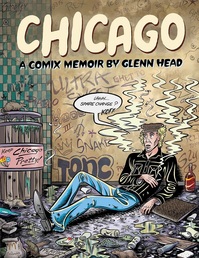 |
| Fantagraphics |
| Chicago Cover – Click to Enlarge |
Glenn Head is as close to underground comics royalty as can exist in a scene that openly scorns hierarchies. He learned from Art Spiegelman at the School for Visual Arts, and has been published in R. Crumb’s Weirdo and Fantagraphics’ Zero Zero before being nominated for Harvey and Eisner awards for his own anthologies, Snake Eyes and Hotwire. Last week, his long-awaited, semi-autobiographical comic, Chicago, was released after almost a decade of work and anticipation. It’s the story of “Glen,” who bounces from art school in Cleveland to find his glory in Chicago with no real plan or understanding of the trouble he was about to get into. The comic has won praise here and around the comics world for its honesty, and for Head’s typically hyper-detailed, stunning art. We had a chance to talk with Glenn about his career and his new book, and get a look at some exclusive preview pages from Chicago. Here is what we learned….
1. Muhammad Ali Is a Critical Character in the Story.
 |
Jim Dandeneau: Tell me a little bit about how Chicago came to be.
Glenn Head: Going back a bit, I did a three-page comic strip entitled The Muhammad Ali Story! This appeared in a solo comic I did for Fantagraphics in 1991: Avenue D. It shows me in Chicago in 1977, homeless, hungry, panhandling…I somehow end up having a back and forth with Muhammad Ali outside Saks Fifth Avenue where his wife was shopping.
This three-page strip was the genesis of Chicago. Drawing it, I always thought “Wouldn’t it be great to draw out this whole insane period in my life, as a book?” This way all these characters, Ali, Crumb, … all the incidents – like the suicide attempt, they just become pieces of the bigger picture….
So the point is this book was percolating for quite a while. Decades. And to be truthful, this isn’t easy material to work with. There were elements of psychic trauma I was trying to capture. It’s kind of like a live wire in my head, some of these experiences.
2. So Is R. Crumb.
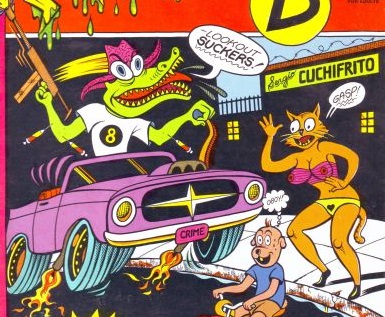 |
| Fantagraphics |
JD: Why is now the right time to tell this story? Or why was 2006?
GH: Because now is the time that I finished it! 2006 was the year that I had geared myself up to face the material. It’s about that simple. As I say, I’d touched on this material earlier, and knew I wanted to delve into it further, but to be emotionally ready – that’s not easy, it takes time. I never could have done this book at an earlier point in my life, it would have been too demanding, too terrifying.
There’s also something else here, which is that I used certain cartoonists as characters in my story, most notably R. Crumb. He is, at this point as much of an important cultural icon as anyone I can think of. And the R. Crumb character has kind of…solidified, if that’s the right word. He’s known to all. Maybe at an earlier point if I’d used him as a character it might seem, I don’t know…fannish. At this point, though, R. Crumb is really just a part of the American cultural landscape. I mean, as well as being one of the best cartoonists ever, let’s not forget.
3. Chicago Is Less “Semi-Autobiographical” and More “Mostly Autobiographical.”
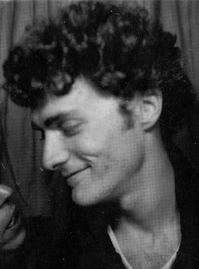 |
JD: There’s an Orwell quote at the beginning – “Autobiography is only to be trusted when it reveals something disgraceful.” This story is pretty raw and real – how close is it to your real experiences?
GH: It’s really very accurate. I’d say 90 to 95% of what’s here happened, and I really tried to depict it as it happened, just as I remember it. It’s really not like I had to embellish anything or heighten any effects, turn the volume up. The volume was way up high in my life then as it was.
I really love that Orwell quote because it says that whatever else you might put on the page, whether it’s how rich you are, how much sex you get, how many people you can beat up, that’s all bullshit. It’s just a mask you’re using for cover. If, on the other hand, things are exposed that show you being genuinely vulnerable, they’re probably true. Like what’s in it for you? Those are the things that you’re supposed to hide. Why would you show them? I like that.
4. This Comic Hurts.
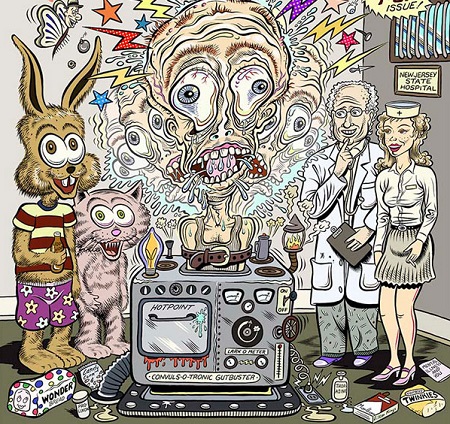 |
| Hotwire #3 |
JD: The Tex Avery panel after Glen meets Robert Crumb was a little jarring. You’ve said before that you “like comics to hurt.” Was that panel part of your approach?
GH: To paraphrase Joe Pesci in Goodfellas, “I ain’t here to amuse you!” In other words if I’m gonna tell my story, showing myself at the mercy of street predators and whatever else when I’m homeless, starving and dirty…why should I make the story go down easy for you? Fuck that. I want you to feel what it felt like to me, I’m not looking to give anyone a nice cozy distance while I struggle to survive – let them feel it too!
I actually don’t think that a lot of experiences that we have are necessarily made better or more “normative” as they’re processed through art. I think trauma is always with us…. And in a way I think I’ve always been attracted to comix because the visual intensity of some of them could be almost like a funhouse mirror of horrors. For me it’s probably like an ADD kid taking speed. The extremeness of it is calming. But that doesn’t lessen the terror.
It’s just a way to process it.
JD: It seems like the central thesis of the story is “time happens.” is that accurate?
GH: Time happens if you’re lucky! The characters of Glen and Sarah, they’re fortunate…they could easily have died young. Sarah, it turns out, has been selling her body for sex, when Glen is revisited by her at the very beginning of the book. She’s only seventeen. My character, when the book opens, is sprawled out in a graveyard laughing at life. So both characters are on a death trip. They’re lucky to get through it alive.
The book shows that journey, in Glen’s case explicitly. In Sarah it’s alluded to. But both of them have decided from the start to go their own way – to take paths that are potentially destructive to them.
So yeah “time happens” but so do a lot of things. Hopefully you survive them.
5. Head Thinks Comics Are Among the Purest Forms of Art out There (Because the Money’s so Terrible, but Still…).
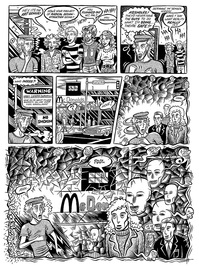 |
| Fantagraphics |
| Chicago p30 – Click to Enlarge |
JD: At the end, when Glen meets up with Sarah, Glen describes the comics world as a racket. Is it still like that? What made you stick around this long?
GH: The comics world is a racket to Glen because he had once looked on it as something better, different, apart from the mundane banalities of everyday life. What he encounters is just another high school cafeteria. If Hollywood is high school with money, then the comix world is high school without money, but there are still the right and wrong tables to be seated at. This is a big surprise to my character, but that’s life.
In fact, the comic book world has always been kind of a down and dirty place with hard-nosed publisher types: hustlers, fly-by-nighters, etc. But really, there’s very little scamming at this point. What would rip-off merchants steal? There’s even less money in it than before!
So maybe it is less of a racket; the comics medium seems to be in good health essentially. Strong work is still being produced, getting out there, reaching people, having an impact. It’s just that there’s even less money in it than before. It takes years to produce a graphic novel; to produce those kind of pages. It’s art for art’s sake.
What makes me stick around this long? I have my story to tell so I have to tell it. It’s probably that simple. For me, drawing comics is an incredibly demanding, exhausting process, even more so with a graphic novel, so the story involved, it has to kind of be a matter of life and death to me. That was the case with Chicago – to actually show moments where I was as crazy as I was, and could have died for being it. Well, there’s a lot at stake there for me, to try and capture it truthfully.
You know, I’m not really a comics fan. But comics is the medium I know. I’m trained in it, I’ve drawn them long enough that if I’m going to tell my story it’s the medium I can use. I know it. So I work in it.
I actually think Chicago could have been made as a movie, an independent film, and it would have worked. It’s not that far from the realm of independent film in its approach to the story. But on the other hand…
I still love comics, I guess. I love that they’re such a quick conduit to another world, and I deeply love the fact that one person can put together on paper their own entire world. That really is just wonderful…you sure can’t get that with a movie! And I still love the bad boy, disreputable, anti-social aura that comics have, or used to! I really love that comics can express what George Orwell might describe as “unpleasant truths.” Comics can cut through the bullshit, say what they have to. Sometimes I really think it’s the most challenging medium – it’s like Chinese. There’s always more to learn.
6. He Also Thinks the Populist Revolution in Comics Has Been a Mixed Bag.
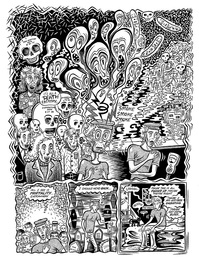 |
| Fantagraphics |
| Chicago p31 – Click to Enlarge |
JD: You’ve been doing this for a long time now, and primarily on the underground side of things. Now, with the Internet and webcomics and zine publishing, it seems like the barrier to entry for making comics and sharing them with the world is much lower than it’s ever been before. Am I way off on that? And if not, do you think that’s a good thing?
GH: Yeah it’s true the barrier to getting your work out there and seen is much lower. Arguably, what that’s also saying is that the bar is set a bit lower for the work, I guess. In the pre-Internet age, people did their mini-comix, their self-pubs, maybe they got together with other comics people, did an anthology. They hustled. And in that process got better, hopefully moved up to finding a publisher. Usually that also meant better production, too. In this respect it was easy to see the progress – everything improved. And you could say, this was kind of like “apprenticing” as a cartoonist. The idea was that by the time you were really getting your work out there, you’d developed your voice, had your chops down.
None of that’s required now! What can you say about that? Sometimes it can seem like the world’s drowning in comics of all types, and of wildly variable quality. It’s impossible to sift through it all – I can’t! Is this a plea for bringing back more “gate-keepers” or “comics gurus,” self-appointed types who decide what’s good enough? No, we’re past that–the world won’t have it anyway. The People own the media now. It’s a tidal wave and there’s no stopping it! It is what it is.
7. Chicago Is Really About How Difficult Life Is, and What You Get From Forcing Your Way Through It.
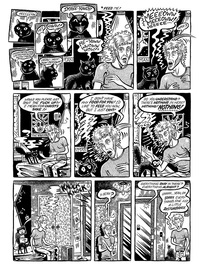 |
| Fantagraphics |
| Chicago p32 – Click to Enlarge |
JD: What are you hoping people take away from reading your story? What are you taking away by telling it?
GH: What I’m really hoping people take away from reading Chicago is the high price one pays to be an artist. And to find oneself. And to break free of everything you’re told is reality. That’s what my character does in Chicago. He breaks free of the world he knows and everything it tells him he is or has to be. Chicago is about tearing the skin right off of yourself to see what’s underneath.
And it’s really about the consequences of doing that. About how forcing a drastic change on oneself can have repercussions. There’s a tear in the social fabric of Glen’s life, by the time his journey is over. It’s not like he’s had his adventure and come to a pot of gold or something. What he’s learned is that the world he idealized doesn’t really exist … and he’s back at the other one he wanted out of – his parents. After all he’s been through, he’s not even that sure he wants to live, but maybe it’s worth it to stick around. Maybe – who knows? He hasn’t even had sex yet….
And of course I’m also hoping people are entertained by it. It’s an engaging, at times harrowing story. Disturbing in some ways – but a strong read. What am I taking away by telling it? My ownership of it – it’s no longer mine as a story. As long as it was only mine and hardly told I could hold it, keep it close to the vest. So in a way I’m free of it – it’s everyone’s now; everyone who reads it. I’m letting go of it.
Also, I give up a bit of safety. I’m naked in this book, literally, not hiding behind anything…not a tough guy stance, a form of jokiness, being a wise-guy. I’m not using that to keep a safe comfortable distance from the reader. So there’s no armor. That’s kind of scary. But also liberating.
Chicago is available now at comic shops everywhere or online via Comixology. And Glenn will be at Desert Island Comics on Thursday night, 9/10, to sign copies of the book.
Previously by Jim Dandeneau
6 Nerdy Cool Things We Saw at the Tribeca Film Festival
10 Important Clues to the Conclusion of Multiversity
The 9 Worst, Most Exploitative Nerdy Crowdfunding Campaigns
11 Valiant Comics We Want To See On The Big Screen
11 Things We Learned About Oni’s New Rick & Morty Comic From Zac Gorman
9 Cool Things About Frankenstein Underground We Learned From Mike Mignola
The 26 Coolest Things at Toy Fair 2015
The 20 Best Comics of 2014
10 Things We Learned from Scott Snyder about Wytches
Topless Robot’s 2014 Holiday Gift Guide – Comics
12 Other Events Marvel Should Revisit for Secret Wars
The 14 Biggest Highlights from NY Comic Con 2014
4 Reasons Why We Shouldn’t (And 4 Why We Should) Get Excited About the Kirby Settlement
The 7 Best Ways to Clear Up Comics Continuity Errors
